

Lars von Trier. Andrei Tarkovsky. Quentin Tarantino. Early life[edit] Tarantino was born in Knoxville, Tennessee in 1963.[6] He is the son of actor and amateur musician Tony Tarantino and nurse Connie McHugh.[7][8] He has a younger half-brother named Ron.
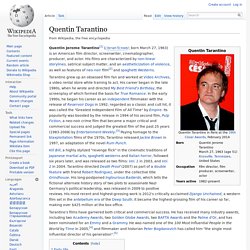
Tarantino grew bored with the James Best Acting School and left after two years, although he kept in touch with all of his acting friends. He then landed a job which threatened to interfere with his long-term acting ambitions.[17] As an employee of Video Archives, a now-defunct video rental store in Manhattan Beach, he and fellow movie enthusiasts (including Roger Avary) discussed cinema and customer video recommendations at length.
He paid close attention to the types of films people liked to rent and has cited that experience as inspiration for his directorial career.[18] Tarantino has been quoted as saying: "When people ask me if I went to film school I tell them 'no, I went to films. Ridley Scott. Michel Gondry. Martin Scorsese. Alain Resnais. Roman Polanski. Roman Polanski (born Rajmund Roman Thierry Polański; 18 August 1933) is a Polish and, since 1976, naturalized-French[1] film director, producer, writer, and actor.

Having made films in Poland, the United Kingdom, France and the United States, he is considered one of the few "truly international filmmakers. "[2] Polanski's films have inspired diverse directors, including the Coen brothers,[3] Wes Anderson,[4] David Fincher,[5] Atom Egoyan,[6] Darren Aronofsky,[7] Park Chan-wook,[8] Sean Durkin,[9] Abel Ferrara,[10] and Wes Craven.[11] Early life World War II I had just been visiting my grandmother ... when I received a foretaste of things to come. As he roamed the countryside trying to survive in a Poland now occupied by German troops, he witnessed many horrors, such as being "forced to take part in a cruel and sadistic game in which German soldiers took shots at him for target practice After the war After the war he was reunited with his father, and moved back to Kraków.
Film director 1960s. Terrence Malick. Early life[edit] Film career[edit] Malick started his film career after earning an MFA from the AFI Conservatory in 1969, directing the short film "Lanton Mills".
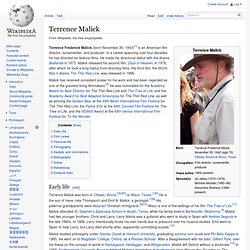
At the AFI, he established contacts with people such as Jack Nicholson, longtime collaborator Jack Fisk, and agent Mike Medavoy, who procured for Malick freelance work revising scripts. He is credited with the screenplay for Pocket Money (1972), and he wrote an early draft of Dirty Harry (1971).[14] Paramount Pictures produced Malick's second film, Days of Heaven (1978), about a love triangle that develops in the farm country of the Texas Panhandle in the early 20th century. Chris Wisniewski about Days of Heaven and The New World[17] David Lynch.
Fritz Lang. Friedrich Christian Anton "Fritz" Lang (December 5, 1890 – August 2, 1976) was a German-Austrian filmmaker, screenwriter, and occasional film producer and actor.[1] One of the best known émigrés from Germany's school of Expressionism, he was dubbed the "Master of Darkness" by the British Film Institute.[2] Life and career[edit] Early life[edit] Lang was born in Vienna as the second son of Anton Lang (1860–1940),[4] an architect and construction company manager, and his wife Pauline "Paula" Lang née Schlesinger (1864–1920).
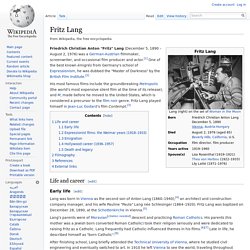
Stanley Kubrick. Alfred Hitchcock. Over a career spanning more than half a century, Hitchcock fashioned for himself a distinctive and recognisable directorial style.[6] He pioneered the use of a camera made to move in a way that mimics a person's gaze, forcing viewers to engage in a form of voyeurism.[7] He framed shots to maximise anxiety, fear, or empathy, and used innovative film editing.[7] His stories often feature fugitives on the run from the law alongside "icy blonde" female characters.[8][9] Many of Hitchcock's films have twist endings and thrilling plots featuring depictions of violence, murder, and crime.
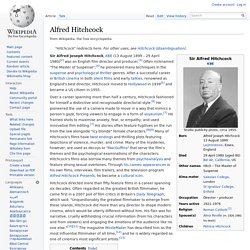
Many of the mysteries, however, are used as decoys or "MacGuffins" that serve the film's themes and the psychological examinations of the characters. Hitchcock's films also borrow many themes from psychoanalysis and feature strong sexual overtones. Coen brothers. Darren Aronofsky. Ingmar Bergman. Early life[edit] "I devoted my interest to the church's mysterious world of low arches, thick walls, the smell of eternity, the coloured sunlight quivering above the strangest vegetation of medieval paintings and carved figures on ceilings and walls.
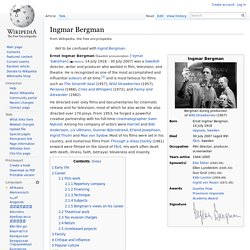
There was everything that one's imagination could desire — angels, saints, dragons, prophets, devils, humans". Although raised in a devout Lutheran household, Bergman later stated that he lost his faith at age eight and only came to terms with this fact while making Winter Light in 1962.[4] Bergman’s interest in theatre and film began early: "At the age of nine, he traded a set of tin soldiers for a magic lantern, a possession that altered the course of his life.